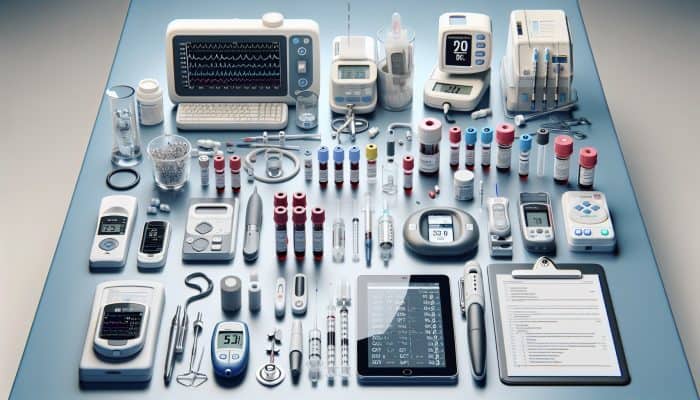Comprehensive Insights into Diabetes Blood Testing Procedures
What Does a Diabetes Blood Test Entail?

Diabetes Blood Test in Abingdon-on-Thames: A diabetes blood test is an essential medical procedure aimed at evaluating your blood glucose levels, which is critical for both the diagnosis and ongoing management of diabetes. This testing plays a pivotal role in maintaining your overall health, as it can identify any irregularities in your glucose levels that may indicate diabetes or prediabetes. Various types of blood tests are available, each specifically designed for distinct purposes. The most commonly used diabetes blood tests include:
- Fasting Blood Glucose Test
- Oral Glucose Tolerance Test (OGTT)
- Haemoglobin A1c Test
- Random Blood Glucose Test
- Continuous Glucose Monitoring
- Fructosamine Test
By familiarising yourself with these diverse tests, you will be empowered to take control of your health and make well-informed decisions regarding your diabetes management.
Why is Regular Testing Vital for Effective Diabetes Management?
Consistent testing is absolutely crucial for successful diabetes management, as it empowers individuals to monitor their blood sugar levels over time. This continual oversight is fundamental for making necessary adjustments to medications, dietary habits, and lifestyle choices, ensuring optimal health maintenance. The benefits of adhering to a routine of regular testing include:
- Early detection of diabetes
- Prevention of complications such as neuropathy and retinopathy
- Enhanced control of blood sugar levels
- Informed decision-making regarding nutrition and exercise
- Improved communication with healthcare providers
By establishing a consistent routine of regular blood tests, individuals can adopt a proactive approach towards their health and overall well-being.
How Often Should You Schedule Blood Tests for Diabetes?
The recommended frequency for diabetes blood tests can vary based on several factors, including whether you have been diagnosed with diabetes, your individual risk factors, and the advice given by your healthcare professional. For those diagnosed with diabetes, testing may be advised anywhere from several times a day to once every few months. In contrast, individuals at risk may only need to test once a year. Regular medical check-ups are essential for monitoring any changes in your health and making necessary adjustments to your management strategy.
Finding Diabetes Blood Testing Services in Abingdon-on-Thames

Healthcare Facilities and Hospitals Offering Diabetes Testing Services
In Abingdon-on-Thames, a variety of healthcare facilities provide an extensive range of diabetes blood testing services. A prominent provider is Abingdon Hospital, which offers comprehensive diabetes care alongside various testing options. Additionally, numerous GP clinics throughout the town are well-equipped to conduct blood tests and manage diabetes effectively. These local resources ensure that residents have convenient access to essential diagnostic services without the need for lengthy travel.
Exploring Private Testing Options for Diabetes
If you are looking for faster or more personalised services, private clinics in Abingdon-on-Thames offer a multitude of options for diabetes blood testing. These facilities frequently provide quicker results than public services and may also offer more flexible appointment scheduling. Some well-known private clinics include:
- The Abingdon Clinic
- Oxford Private Hospitals
- Healthcheck Clinic
- Viva Health
Choosing a private service can significantly enhance your overall experience, especially if you have specific concerns or require immediate test results.
Mobile Testing Units: Convenient Diabetes Testing at Your Doorstep

Mobile testing units present an innovative solution to diabetes blood testing, especially beneficial for individuals who may find it challenging to travel to a clinic. These units regularly visit Abingdon-on-Thames, delivering crucial testing services directly to your community. This initiative is particularly advantageous for elderly patients or those with mobility challenges, ensuring that everyone has the opportunity to effectively monitor their health.
Pharmacies Providing Accessible Diabetes Testing Services
Several pharmacies in Abingdon-on-Thames offer convenient options for diabetes blood testing. Well-known pharmacies such as Boots and Superdrug frequently provide blood glucose testing services that do not necessitate an appointment. This accessibility allows individuals to check their blood glucose levels swiftly and efficiently while juggling other responsibilities, making it an excellent choice for those with busy lifestyles.
Expert Perspectives on Diabetes Blood Testing in Abingdon-on-Thames
What Do Experts Recommend Regarding Testing Frequency?
Experts assert that the frequency of testing should be customised to fit individual health conditions. For instance, a patient with fluctuating blood sugar levels may require more frequent monitoring than someone whose diabetes is well-controlled. Real-world cases indicate that personalised testing schedules can lead to significant improvements in patient outcomes, effectively mitigating the risk of complications.
How Can Regular Testing Positively Impact Your Life?
Incorporating regular testing into your routine can profoundly enhance your quality of life by fostering more effective diabetes management. By consistently monitoring your blood sugar levels, you can make informed decisions regarding your nutrition and physical activity, ultimately reducing the risk of complications. Simple strategies, such as scheduling tests at the same time each month or setting reminders, can simplify the process and make it more manageable.
What Are the Latest Innovations in Diabetes Testing?
Recent advancements in diabetes testing have introduced more accurate and less invasive methods, including continuous glucose monitors (CGMs) and flash glucose monitoring systems. These technological innovations allow for real-time tracking of glucose levels with minimal discomfort, significantly benefiting patients by providing immediate feedback and enhancing their ability to effectively manage their condition.
Essential Preparations for Your Diabetes Blood Test
What Preparatory Steps Should You Undertake Before the Test?
Before undergoing a diabetes blood test, it is essential to follow any pre-test guidelines provided by your healthcare practitioner. Fasting may be required for certain tests, such as the fasting blood glucose test, where you typically need to refrain from eating for at least 8 hours prior to testing. Adhering to these guidelines is vital for ensuring the accuracy of your results, emphasising the importance of confirming any details with your doctor beforehand.
What Can You Expect During the Blood Testing Procedure?
During a diabetes blood test, you can anticipate a straightforward procedure involving a simple blood draw, typically from your arm. This process is quick and relatively painless, usually taking less than five minutes. The healthcare professional will disinfect the area, insert a needle to collect blood, and may apply a small bandage afterwards. Most individuals find that the experience is considerably less intimidating than they initially expected.
What Occurs After Your Blood Test is Completed?
Once your diabetes blood test has been finalised, you will generally be asked to wait briefly for results, especially if immediate analysis is necessary. Your healthcare provider will later interpret the results and discuss them with you during a follow-up appointment. This discussion is crucial for comprehending your glucose levels and determining any needed modifications to your diabetes management plan.
Interpreting Your Diabetes Test Results
What Are Considered Healthy Test Results?
Normal blood glucose levels can fluctuate, but a fasting level below 6 mmol/L is generally considered healthy. Grasping these ranges is fundamental for interpreting your results, as they indicate whether your glucose levels reside within a healthy spectrum. Being informed about what constitutes normal levels enables you to proactively and effectively manage your health.
What Do Elevated Test Results Imply?
Elevated blood glucose levels, typically exceeding 7 mmol/L when fasting, may indicate the presence of diabetes or prediabetes. If your results fall outside the normal range, it is crucial to consult your healthcare provider for an accurate diagnosis and treatment plan. Early intervention is vital, as it can lead to improved management and reduce the risk of long-term complications associated with uncontrolled diabetes.
How Are Your Results Analysed and Interpreted?
Your healthcare provider will analyse your test results by taking into account various factors, including your medical history, current symptoms, and individual risk factors. This comprehensive evaluation ensures that your results are contextualised appropriately, guiding any necessary adjustments in your treatment or management plan. Maintaining open communication with your doctor regarding these interpretations is essential for effective diabetes management.
Proven Strategies for Managing Diabetes After Testing
What Lifestyle Changes Are Essential for Optimal Management?
Successful diabetes management often requires significant lifestyle changes, especially concerning nutrition and physical activity. Embracing a balanced diet rich in whole foods while minimising refined sugars can greatly assist in regulating blood sugar levels. Engaging in regular physical activity, such as walking, cycling, or participating in other forms of exercise, can enhance insulin sensitivity and help maintain a healthy weight, which is crucial for comprehensive diabetes management.
How Can Medications Aid in Diabetes Management?
For many individuals with diabetes, medication plays a crucial role in effectively controlling blood sugar levels. Depending on your specific condition, your healthcare provider may prescribe insulin or oral medications like metformin. These medications can significantly assist in managing glucose levels, facilitating better control over your diabetes. Regular consultations with your healthcare provider ensure that your medication remains appropriate and effective for your specific needs.
What Are the Best Long-Term Strategies for Effective Management?
The long-term management of diabetes includes regular check-ups, continuous monitoring of blood sugar levels, and adapting lifestyle choices to maintain healthy glucose levels. Establishing a consistent routine can support ongoing monitoring and facilitate timely adjustments to your management plan, ultimately helping to prevent complications related to diabetes. This proactive approach is vital for sustaining long-term health.
Research-Backed Advantages of Diabetes Blood Testing in Abingdon-on-Thames
How Does Early Diagnosis Enhance Health Outcomes?
Early identification of diabetes can significantly avert severe complications, such as heart disease and kidney issues. For example, patients diagnosed early may have the opportunity to implement lifestyle changes that substantially reduce their risk factors. Real-world examples illustrate that proactive management, stemming from early detection, can lead to improved health outcomes and an enhanced quality of life.
What Benefits Does Local Testing Provide?
Local testing services in Abingdon-on-Thames deliver numerous benefits, including convenience and quicker access to healthcare services. By using nearby facilities, individuals can seamlessly incorporate testing into their routines without the stress of travelling long distances. Accessing these local resources enables residents to effectively monitor their health and promptly address any concerns that may arise.
How Have Diabetes Testing Methods Progressed Over Time?
Diabetes testing methods have evolved remarkably, becoming more accurate and less invasive over time. Innovations such as finger-prick blood tests and continuous glucose monitors have transformed patient experiences, enabling more comfortable testing without sacrificing accuracy. These advancements have streamlined diabetes management and made it more accessible for individuals living with the condition.
How Does Regular Testing Contribute to Overall Health Improvement?
Regular diabetes blood tests are vital for monitoring your health over time, facilitating timely adjustments to treatment strategies. Consistent testing aids in tracking fluctuations in blood sugar levels, providing invaluable information that can influence dietary and lifestyle choices. Highlighting the significance of ongoing testing not only supports immediate management but also promotes sustainable long-term health.
Addressing Common Concerns and Frequently Asked Questions
Is the Blood Testing Procedure Painful?
The blood test typically involves a quick needle prick, which is generally not painful but may result in a brief sensation of discomfort. Most patients find that their anticipation of the procedure is more daunting than the actual experience, which usually lasts only a few seconds.
Can You Eat Before the Test?
Fasting is often required before a diabetes blood test; however, this requirement varies depending on the specific type of test being performed. Always confirm with your healthcare provider whether fasting is necessary for your particular test to ensure accurate results.
What Is the Expected Wait Time for Your Test Results?
The timeframe for receiving results can range from a few hours to several days, depending on the testing facility and the specific type of test conducted. Your healthcare provider will inform you of when to expect your results and will schedule a follow-up appointment to discuss them in detail.
What Actions Should You Take If Your Results Are Elevated?
If your results indicate high blood sugar levels, it is crucial to consult your healthcare provider immediately. They will assist in interpreting the results in relation to your overall health and may recommend lifestyle modifications or medications to help manage your blood sugar levels effectively.
Is It Possible to Reverse Diabetes?
While diabetes cannot be entirely reversed, it can be effectively managed through lifestyle changes, proper weight management, and appropriate medication. Some individuals with Type 2 diabetes may achieve remission, enabling them to maintain normal glucose levels without requiring medication.
What Symptoms Suggest High Blood Sugar Levels?
Common symptoms associated with high blood sugar levels include increased thirst, frequent urination, fatigue, blurred vision, and headaches. If you experience these symptoms, it is crucial to check your blood sugar levels and consult your healthcare provider for further guidance.
How Does Stress Affect Blood Sugar Levels?
Stress can significantly impact blood sugar levels, causing them to increase due to the release of hormones such as cortisol. Effectively managing stress through techniques such as mindfulness, physical activity, and adequate sleep can help maintain stable glucose levels, which is essential for overall health.
What Is the Best Time to Test Blood Sugar Levels?
The optimal time to test blood sugar levels can vary based on individual circumstances. Common testing times include first thing in the morning, before meals, or two hours after eating to evaluate the impact of food on blood glucose levels.
How Can You Access Support for Diabetes Management?
Accessing support for managing diabetes can be achieved through local health services, support groups, or online communities. Engaging with others who share similar experiences can provide valuable resources, emotional support, and shared insights throughout your diabetes journey.
Does Insurance Cover Diabetes Blood Testing?
Most health insurance plans in the UK typically cover diabetes blood testing; however, it is essential to verify with your provider for specific coverage details. Discussing your needs with your healthcare provider can assist you in navigating costs effectively.
Connect with us on Facebook!
This Article Was First Found On https://bloodtest.co.uk
The Article Diabetes Blood Test Guide: Abingdon-on-Thames Insights Was Found On https://limitsofstrategy.com


